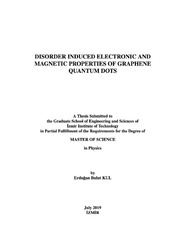Please use this identifier to cite or link to this item:
https://hdl.handle.net/11147/7476Full metadata record
| DC Field | Value | Language |
|---|---|---|
| dc.contributor.advisor | Güçlü, Alev Devrim | |
| dc.contributor.author | Kul, Erdoğan Kul | - |
| dc.date.accessioned | 2019-12-13T08:40:52Z | |
| dc.date.available | 2019-12-13T08:40:52Z | |
| dc.date.issued | 2019-07 | en_US |
| dc.identifier.citation | Kul, E. B. (2019). Disorder induced electronic and magnetic properties of graphene quantum dots. Unpublished master's thesis, İzmir Institute of Technology, İzmir, Turkey | en_US |
| dc.identifier.uri | https://hdl.handle.net/11147/7476 | |
| dc.description | Thesis (Master)--Izmir Institute of Technology, Physics, Izmir, 2019 | en_US |
| dc.description | Includes bibliographical references (leaves: 41-46) | en_US |
| dc.description | Text in English; Abstract: Turkish and English | en_US |
| dc.description.abstract | In this thesis, we aim to study magnetic properties of hexagonal shaped graphene quantum dots with armchair edge in the case of atomic collapse by modelling two vacancies on it. The measured relativistic electron transport property of the graphene allows us to observe the phenomenon called "atomic collapse" in a small energy scale which existence is proven theoretically before for atoms whose atomic number is higher than 170. First we modelled a Coulomb potential at the center of a hexagonal shaped and armchair edged GQD and examined by using tight-binding method. We obtain similar results with previous works. After that, we started to study magnetic properties of the dot by meanfield Hubbard method which includes spins into calculation. We modelled a vacancy close to the center of the dot and examined electronic and magnetic properties by MFH metod. Also we modelled two vacancies on the dot that we changed the distance between them and the direction respectively. Also by applying Coulomb potential at the center of the vacancies we examined magnetic behaviour at the atomic collapse regime. Also, we compared our results with the works obtained by using RKKY (Ruderman-Kittel- Kasuya-Yosida) interaction method which considers the indirect interactions of magnetic impurities that uses electrons of metallic substrates. We found that increasing Coulomb potential and increasing distance between the vacancies, reduces correlations of electrons around the vacancies. The ground state energy difference between ferromagnetic and antiferromagnetic systems, that proportional to interaction strength, shows similar behaviour that has been observed by using RKKY method. Also if we take out two atoms from the same sublattice and with the same spin property, changing Coulomb potential leads to ferromagnetic-anti-ferromagnetic phase transition, independent from the atomic collapse behaviour. Also we observed that there is no direct link between the magnetic transition and the energy difference of the vacancy states. | en_US |
| dc.description.abstract | Bu tezde, armchair kenarlı, altıgen şeklindeki Grafen Kuantum Noktalarında iki boşluk modelleyerek, atomik çökme bölgesindeki manyetik davranışlarını incelemeyi hedefledik. Grafenin ölçülen, relativistik elektron iletim özelliği bizi; atom numarası 170'ten fazla olan atomlar için varlığı teorik olarak ispat edilmiş, atomik çökme davranışını düşük enerji seviyelerinde gözlemlememize izin verir. İlk olarak; grafende görülen atomik çökme durumunu, armchair kenarlı altıgen grafen Kuantum Noktalarında merkeze bir Coulomb potansiyeli koyup, sıkı bağ modelini kullanarak inceledik ve literatür ile uyumlu sonuçlar elde ettik. Bunun üzerine elektron spinlerini de hesaba katan bir model olan ortalama-alan Hubbard modelini kullanarak, kuantum noktanın manyetik özelliklerini incelemeye geçtik. Kullandığımız grafen kuantum noktaları üzerinde iki adet atomik boşluk modelleyip, aralarındaki mesafeyi ve duruş yönlerini değiştirdik. Ayrıca yarattığımız boşlukların bulunduğu pozisyonlara Coulomb potansiyeli uygulayarak atomik çökme bölgesindeki manyetik davranışları gözlemledik. Ayrıca, elde ettiğimiz sonuçlarla RKKY (Ruderman-Kittel-Kasuya-Yosida) etkileşimi modeline göre elde edilmiş sonuçları karşılaştırdık. Bu model manyetik momente sahip safsızlık atomlarının metale ait elektronlar vasıtasıyla dolaylı bir şekilde birbiriyle etkileşimini tanımlar. Yaptığımız çalışmalarda artan Coulumb potansiyelinin ve atomik boşluklar arasındaki artan mesafenin atomik boşluklar etrafındaki elektronlar arasındaki korelasyonu azalttığını gözlemledik. Ferromanyetik ve anti-ferromanyetik taban durumu enerji farkı ile orantılı olan; etkileşim katsayısının önceden RKKY metodu ile bulunan sonuçlarla uyumlu sonuç verdiğini bulduk. Ayrıca değişen Columb potansiyelinin atomik çökme davranışından bağımsız olarak ferromanyetik- anti-ferromanyetik faz değişimine yol açtığını gözlemledik (AA durumu). Ayrıca manyetik faz değişimi ile atomik boşluk durumlarının enerji farkları arasında direkt bir bağlantı olmadığını gözlemledik. | en_US |
| dc.description.sponsorship | TUBITAK (116F152) | en_US |
| dc.format.extent | x, 46 leaves | en_US |
| dc.language.iso | en | en_US |
| dc.publisher | Izmir Institute of Technology | en_US |
| dc.rights | info:eu-repo/semantics/openAccess | en_US |
| dc.subject | Graphene quantum dots | en_US |
| dc.subject | Graphene | en_US |
| dc.subject | Hexagonal shaped | en_US |
| dc.subject | Coulomb potential | en_US |
| dc.title | Disorder induced electronic and magnetic properties of graphene quantum dots | en_US |
| dc.title.alternative | Grafen kuantum noktaların düzensizliklerden doğan elektrik ve manyetik özellikleri | en_US |
| dc.type | Master Thesis | en_US |
| dc.institutionauthor | Kul, Erdoğan Kul | - |
| dc.department | Thesis (Master)--İzmir Institute of Technology, Physics | en_US |
| dc.relation.tubitak | info:eu-repo/grantAgreement/TUBITAK/MFAG/116F152 | |
| dc.relation.publicationcategory | Tez | en_US |
| item.languageiso639-1 | en | - |
| item.fulltext | With Fulltext | - |
| item.openairecristype | http://purl.org/coar/resource_type/c_18cf | - |
| item.openairetype | Master Thesis | - |
| item.grantfulltext | open | - |
| item.cerifentitytype | Publications | - |
| Appears in Collections: | Master Degree / Yüksek Lisans Tezleri | |
Files in This Item:
| File | Description | Size | Format | |
|---|---|---|---|---|
| T001937.pdf | MasterThesis | 25.53 MB | Adobe PDF |  View/Open |
CORE Recommender
Page view(s)
114
checked on Jul 22, 2024
Download(s)
90
checked on Jul 22, 2024
Google ScholarTM
Check
Items in GCRIS Repository are protected by copyright, with all rights reserved, unless otherwise indicated.